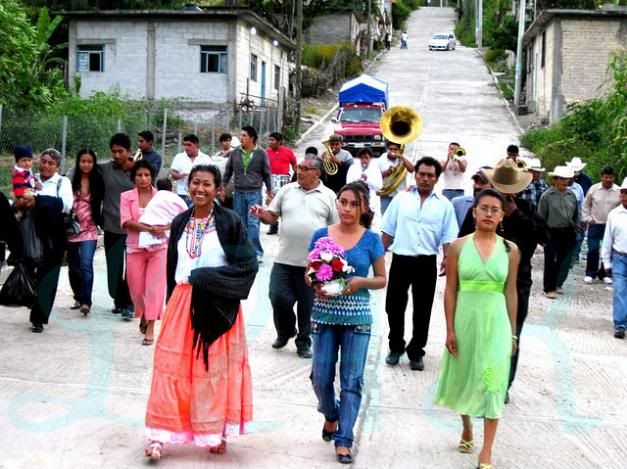ECOLOGY OF TLACOTEPEC: MMFRP RESEARCH ABSTRACT
 AbstractScholarship concerning ecology and climate change has discussed how these factors, in addition to internal local response and economic remedies, may or may not affect migration. Many scholars argue that social, political and economic factors play a large role in climate change. However, the current literature still seems to lack a clear understanding of the link between climate change, water resources and out-migration. Although it would be nearly impossible to link all three aspects in a linear or causal manner, with our studies of Tlacotepec, Mexico, we seek to investigate the looming subjects of land erosion, desertification and lack of accessible water. By examining other possible factors—such as the changing nature of land ownership, access to credit and irrigation water and perceptions of agriculture as a viable economic opportunity—we hope to add a unique and extensive understanding to the current literature.Current ScholarshipCharnley discusses a “cascade effect,” in which migration may cause environmental change in the receiving location, spurring another round of migration. Hugo argues that migration is affected by the environment, but that the environment can simultaneously be affected by migration. His carrying-capacity model predicts that carrying capacity falls as a result of slash-and-burn farming or deforestation in small, isolated communities with limited economic resources, where inhabitants often turn to migration as a solution. Gray, on the other hand, argues that the link between environmental degradation and migration is overemphasized, based on work done in rural Ecuador. We wish to contribute to literature on the environment and migration by using the Tlacotepec case study to weigh in on the debate over the degree to which such links are measurable.GoalsStudied responses to environmental problems are varied. It is clear that in some areas, migration is the only viable option for economic sustainability. As Najib discusses, migrants tend to have a relatively good awareness of environmental issues but do not have the means to focus remittances on innovation that could alleviate their condition. Migrants and non-migrants alike agreed that scarce resources needed to be conserved, but few were willing to make the necessary changes in their daily lives. We are curious to see if a similar situation can be measured among Tlacotepenses. We are also interested in furthering the understanding of the effects of transnational participation in projects related to climate changes and increasingly degrading land conditions. Some scholars have shown that these can be positive factors in agricultural development and growth of social capital, while others have found they can have an unintentionally negative effect on the resourcefulness or even awareness of home-community residents. There is a generous amount of research on what determines a community’s ability to respond to both sustained and sudden crises. Our research will aim to understand in what ways Tlacotepenses have responded to their particular situation and then fit our finding into the larger body of research.Photo courtesy of L24K.
AbstractScholarship concerning ecology and climate change has discussed how these factors, in addition to internal local response and economic remedies, may or may not affect migration. Many scholars argue that social, political and economic factors play a large role in climate change. However, the current literature still seems to lack a clear understanding of the link between climate change, water resources and out-migration. Although it would be nearly impossible to link all three aspects in a linear or causal manner, with our studies of Tlacotepec, Mexico, we seek to investigate the looming subjects of land erosion, desertification and lack of accessible water. By examining other possible factors—such as the changing nature of land ownership, access to credit and irrigation water and perceptions of agriculture as a viable economic opportunity—we hope to add a unique and extensive understanding to the current literature.Current ScholarshipCharnley discusses a “cascade effect,” in which migration may cause environmental change in the receiving location, spurring another round of migration. Hugo argues that migration is affected by the environment, but that the environment can simultaneously be affected by migration. His carrying-capacity model predicts that carrying capacity falls as a result of slash-and-burn farming or deforestation in small, isolated communities with limited economic resources, where inhabitants often turn to migration as a solution. Gray, on the other hand, argues that the link between environmental degradation and migration is overemphasized, based on work done in rural Ecuador. We wish to contribute to literature on the environment and migration by using the Tlacotepec case study to weigh in on the debate over the degree to which such links are measurable.GoalsStudied responses to environmental problems are varied. It is clear that in some areas, migration is the only viable option for economic sustainability. As Najib discusses, migrants tend to have a relatively good awareness of environmental issues but do not have the means to focus remittances on innovation that could alleviate their condition. Migrants and non-migrants alike agreed that scarce resources needed to be conserved, but few were willing to make the necessary changes in their daily lives. We are curious to see if a similar situation can be measured among Tlacotepenses. We are also interested in furthering the understanding of the effects of transnational participation in projects related to climate changes and increasingly degrading land conditions. Some scholars have shown that these can be positive factors in agricultural development and growth of social capital, while others have found they can have an unintentionally negative effect on the resourcefulness or even awareness of home-community residents. There is a generous amount of research on what determines a community’s ability to respond to both sustained and sudden crises. Our research will aim to understand in what ways Tlacotepenses have responded to their particular situation and then fit our finding into the larger body of research.Photo courtesy of L24K.